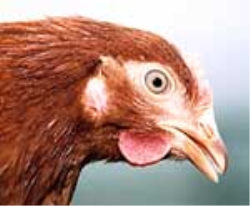
Free-range poultry flocks that are not wormed at least every 12 weeks stand more than an 80 per cent chance of being infected with worms. This means the birds' productivity might be adversely affected, along with egg quality, often at the peak laying period.
This high prevalence, which could signal significant economic losses, is one of the findings of a second independent worm survey of free-range chickens carried out by SAC Veterinary Services avian health unit.
The survey was sponsored by Janssen Animal Health, which offered free-range producers with more than 500 birds a confidential free worm test for their flocks, in association with the British Free-Range Egg Producers Association (BFREPA).
The results are based on faecal samples collected from 83 flocks where the previous worming history was known. Tom Pennycott, senior veterinary investigation officer with SAC, says worm eggs were found in the faeces of 46 flocks. None of the samples collected within four weeks of birds being wormed was positive for worm eggs.
Only two samples from birds wormed in the previous five to eight weeks were positive, and had the minimum detectable number of 50 worm eggs per gram of faeces.
Where intervals between worming were longer, the survey showed the problem to be more serious, and where the interval was nine to 12 weeks 45 per cent of samples were positive for worm eggs.
This rose to 81 per cent positive samples where birds had not been wormed for more than 12 weeks. But for those flocks that had never been wormed, 85 per cent had worms after 30 weeks of age.
The SAC survey results support the recommendations of Janssen Animal Health that the period between worming treatments for free-range flocks should not exceed 12 weeks.
Dave Cunnah, pig and poultry manager with Janssen Animal Health, says the results, coupled with those of the first SAC survey which found worm eggs in samples (taken over a 12-month period) from 26 out of 27 flocks, underlines the need for poultry units to have a strategic worming programme in place.
The previous survey also showed that where a licensed anthelmintic was used to treat chickens before the onset of lay in 13 flocks, none proved positive for worm eggs at 20 weeks of age. The product was Flubenvet™, which is effective against mature and immature stages as well as eggs of the common poultry worm species. Flubenvet is the only wormer licensed for use in poultry and has a zero day withdrawal time for hens laying eggs for human consumption.
Underlining just how dramatically the worm burden can increase on a poultry unit, some worm species can produce over 200,000 eggs a day, and there can be millions of worm eggs on a unit just waiting to be ingested by chickens to infect or reinfect them.
Worms in birds can cause gut damage, leading to poor use of feed, loss of shell and yolk colour, poor egg size and fewer eggs. Heavy worm burdens can lead to loss of bird condition and even death. "The overall effect on a unit's economics can be substantial, but it's a problem that can be controlled for about 2p a bird," he comments.
Free-range and barn flocks are most at risk from worms because of the birds' access to litter and soil contaminated with bird droppings. Litter and soil are the ideal mediums for worm egg survival.
Says Dave Cunnah: "Worming should be given a much higher priority – it should not be treated as a 'last resort' management option. Research points to areas such as nutrition, stress, gut health and the immune system being interlinked. Therefore, management practices which consider the overall well-being of birds should include strategic worming programmes."
Such a programme targets an entire unit. It can bring a dramatic reduction in worm infection levels in a short time. "Strategic worming reduces infection to a level where intervals between treatments can be lengthened, helping to prevent the problem flaring up again," he adds.
To help poultry producers and their veterinary advisers get the best from their worming programme, regular worm egg counts should be conducted on flock faeces. SAC Veterinary Services can provide poultry farmers with easy-to-use sampling kits, available through its veterinary advisers.
